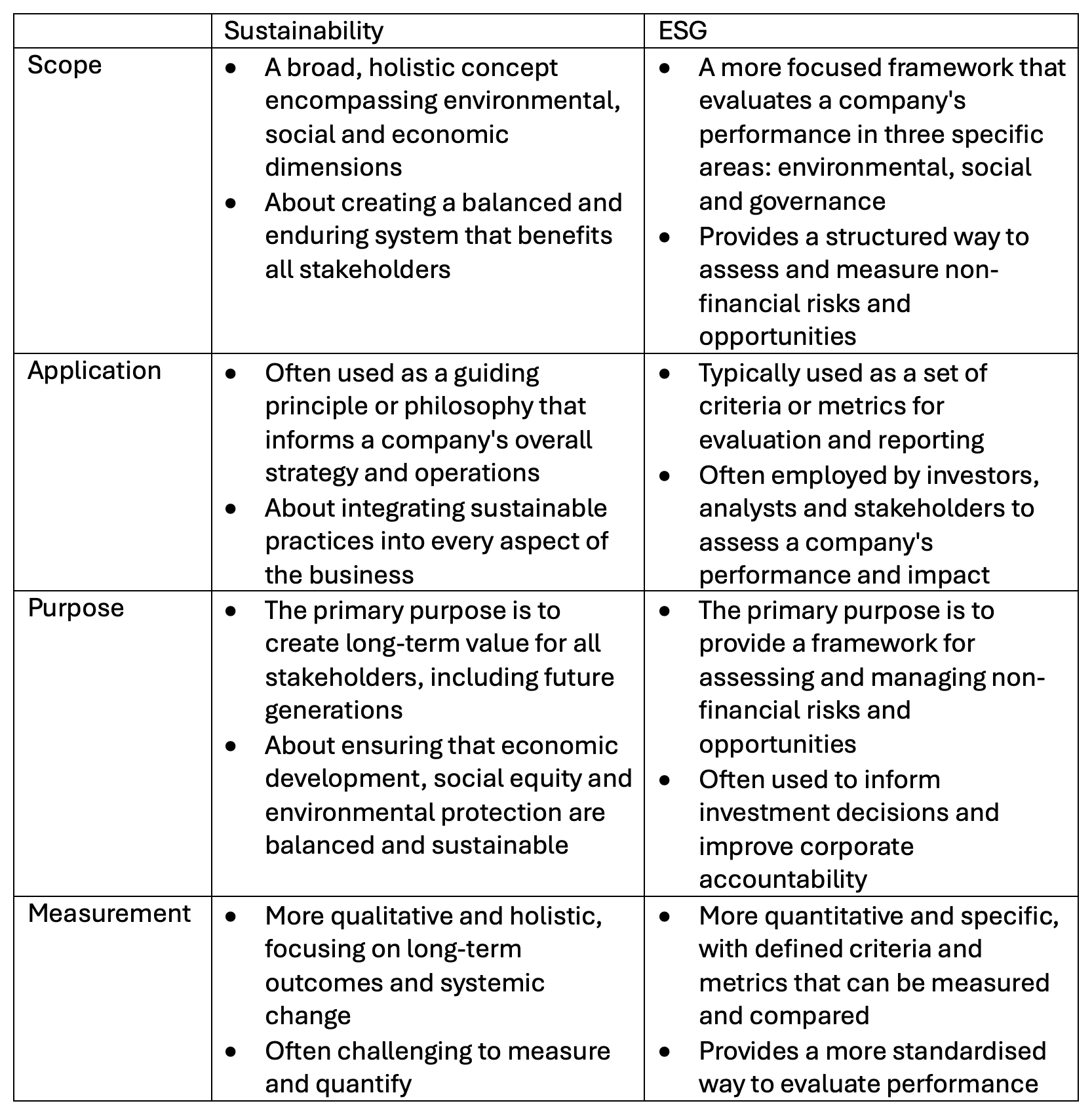The difference between ESG and sustainability

In recent years, the concepts of ESG and sustainability have gained significant traction in the business world. While these terms are often used interchangeably, they represent distinct but interconnected ideas. Understanding the difference between ESG and sustainability is crucial for companies, investors and stakeholders aiming to align their strategies with broader societal and environmental goals.
This article explores the nuances of ESG and sustainability, highlighting their unique characteristics and how they complement each other.
What is sustainability?
Sustainability is a broad concept that refers to the ability to meet the needs of the present without compromising the ability of future generations to meet their own needs. It encompasses three primary pillars: environmental sustainability, social sustainability and economic sustainability. These pillars are often referred to as the ‘triple bottom line’ or the ‘three Ps’ (people, planet, profit).
Environmental sustainability
Environmental sustainability focuses on preserving natural resources and minimising environmental impact. It includes efforts to reduce carbon emissions, conserve water, protect biodiversity and manage waste effectively. The goal is to ensure that ecosystems remain healthy and viable for future generations.
Social sustainability
Social sustainability involves promoting social equity, justice and wellbeing. It includes fair labour practices, community engagement, human rights and ensuring that all individuals have access to basic needs such as education, healthcare and housing. Social sustainability aims to create inclusive societies where everyone can thrive.
Economic sustainability
Economic sustainability is about creating economic value in a way that is equitable and sustainable over the long term. It involves responsible resource management, ethical business practices and ensuring that economic growth does not come at the expense of environmental or social wellbeing.
Sustainability is a holistic approach that seeks to balance these three pillars to create a harmonious and enduring system. It is about creating a world where economic development, social equity and environmental protection coexist.
What is ESG?
ESG, on the other hand, is a framework used to evaluate a company's ESG performance and impact. Investors and stakeholders often use ESG criteria to assess how well a company manages its non-financial risks and opportunities.
Environnement
This criterion evaluates a company's impact on the natural environment. Key considerations include carbon footprint, energy efficiency, waste management, water usage and pollution. Companies are assessed on their efforts to mitigate environmental risks and transition to sustainable practices.
Social
This criterion examines how a company manages relationships with its employees, suppliers, customers and communities. It includes issues like diversity and inclusion, labour practices, human rights, customer satisfaction and community engagement. Companies are expected to foster fair treatment and contribute positively to society.
Gouvernance
This criterion refers to the internal systems and practices that govern a company's decision-making, leadership and accountability. It includes board diversity, executive compensation, shareholder rights, transparency and ethical business practices. Strong governance ensures that companies operate with integrity and align with stakeholder interests.
ESG is a more structured and measurable approach compared to the broader concept of sustainability. It provides specific criteria and metrics that can be used to evaluate and compare companies' performance in these areas.
Key differences between ESG and sustainability
While ESG and sustainability are closely related, they differ in scope, application and purpose. Here are some key distinctions.

How ESG and sustainability complement each other
Despite their differences, ESG and sustainability are deeply interconnected. ESG provides a structured framework for implementing and measuring sustainability initiatives. It offers specific criteria and metrics to help companies track their progress and demonstrate their commitment to sustainability.
For example, a company that adopts sustainable practices, such as reducing its carbon footprint or promoting diversity and inclusion, can use ESG criteria to measure and report its performance. This enhances transparency and accountability while also attracting investors and stakeholders who prioritise ESG factors.
Conversely, sustainability provides the overarching vision and principles that guide ESG initiatives. It ensures that ESG efforts are aligned with broader goals of creating a balanced and enduring system that benefits all stakeholders.
Conclusion
While ESG and sustainability are distinct concepts, they are closely related and mutually reinforcing. Sustainability provides the broad, holistic vision of creating a balanced and enduring system that benefits all stakeholders; ESG offers a structured framework for implementing and measuring specific initiatives that contribute to this vision.
For companies, understanding the difference between ESG and sustainability is crucial for developing effective strategies that align with broader societal and environmental goals. By integrating both concepts into their operations and decision-making, companies can enhance their resilience, reputation and long-term value creation. In an increasingly conscious and interconnected world, the synergy between ESG and sustainability will continue to play a pivotal role in shaping the future of business.




